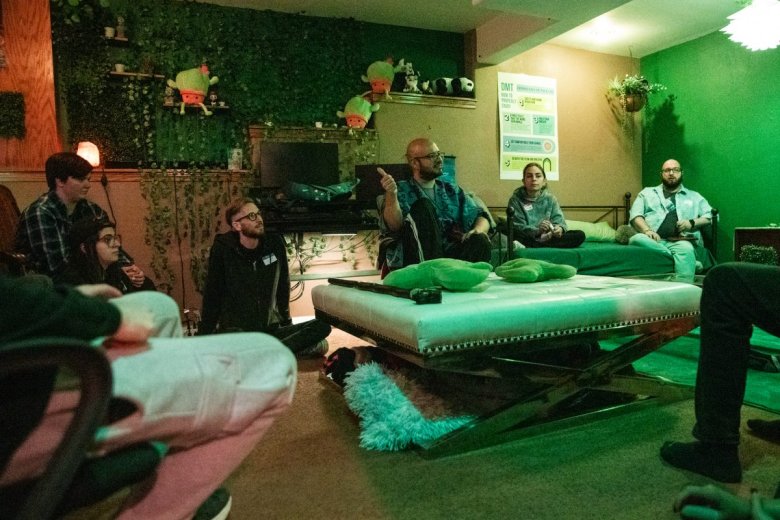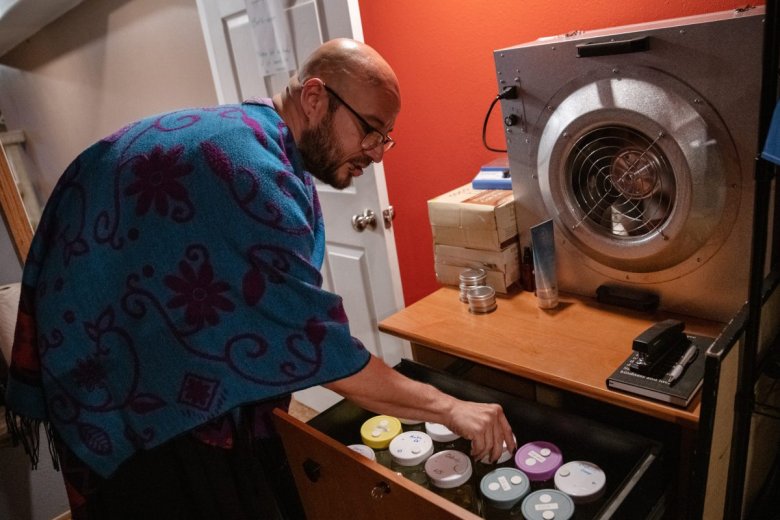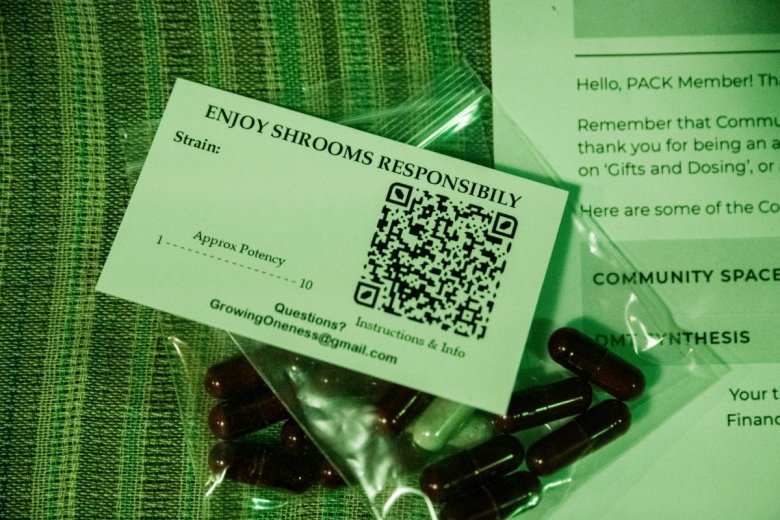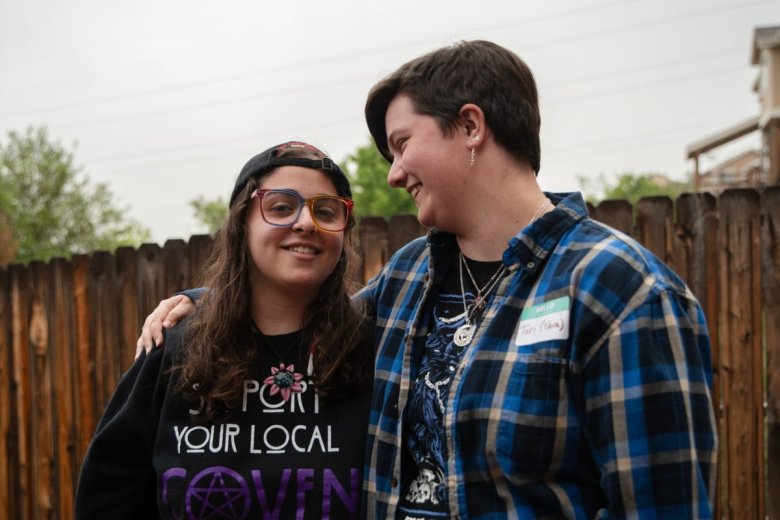COLORADO SPRINGS —The walls of Benji Dezaval’s basement are painted a deep forest green. Vines trickle below a white lotus lantern in the center of the room and a pot of succulents hangs in the corner. The lights are dimmed, giving the room a gentle green glow.Â
About a dozen people face each other, some sitting in chairs and others cross-legged on the floor, as Dezaval guides them in a conversation about community and pride.Â
At a quick glance, it looks a lot like a group therapy session.Â
But as the clock nears 6 p.m., the group gathers around a bar in the next room to accept a “communal gift” — 2 grams of dried psilocybin mushrooms, two weeks’ worth of microdoses or a light dose of dimethyltryptamine, or DMT, which Dezaval extracts from root bark.Â
“Everything is provided for free as an act of wellness,” lead guide Dezaval said before offering the psychedelics he cultivated inside his northeastern Colorado Springs home to the group of faces, some familiar to him, some new.Â
What started with a psychedelic trip in January — when he felt like he was transported to a dense forest in Mexico where an ancestor told him to help others heal with mushrooms — has become a full-time job for Dezaval. He now runs about a dozen gatherings a month, mostly in his home, through what he has dubbed “Colorado’s first psychedelic church.”
During “primary gatherings” at the church, Dezaval guides people into discussion on topics from love to social justice. He also hosts a range of social events, from movie nights to painting while microdosing. Mushrooms along with other psychedelics are offered to anyone 21 years or older.Â
He is in the process of certifying the organization as a religious nonprofit and promotes it on his website, through Meetup, Reddit and Discord, and word of mouth.Â
The church is just one example of a tidal wave of new ideas about how to use psychedelics after Colorado voters approved Proposition 122 in 2022, which decriminalized the use of psilocybin — the psychedelic fungi commonly known as “magic mushrooms” that have long been used by Indigenous people as a natural medicine. Â
 Benji “Dez” Dezaval (third from right), director of The Community of PACK Life, leads a session through “Colorado’s Psychedelic Church” June 19, 2024, in Colorado Springs. The church was founded in early 2024 and emphasizes mindful community organizing and accessible psychedelics through regular meetups and discussions. The church holds three universal truths: “Revere The Self”, “Embracing The Communal Experience”, and acknowledgment that “The Universe Provides”. (Olivia Sun, The Colorado Sun via Report for America)
Benji “Dez” Dezaval (third from right), director of The Community of PACK Life, leads a session through “Colorado’s Psychedelic Church” June 19, 2024, in Colorado Springs. The church was founded in early 2024 and emphasizes mindful community organizing and accessible psychedelics through regular meetups and discussions. The church holds three universal truths: “Revere The Self”, “Embracing The Communal Experience”, and acknowledgment that “The Universe Provides”. (Olivia Sun, The Colorado Sun via Report for America)
Dezaval is not charging for the psychedelics and is not operating his church as a healing center. Under the state’s natural medicine laws, adults 21 years and older are legally allowed to share psychedelics in the context of counseling, spiritual guidance and “community-based use.”
A spokesperson for the state’s Natural Medicine Division declined to comment specifically on the church.
“I use these tools with respect and reverence,” said Dezaval, who worked as a mental health worker for 10 years. “The universe has provided these for us to find our wellness.”Â
As someone who has fought depression and suicidal thoughts, Dezaval said he formed the church to make psychedelics more accessible, knowing firsthand their power to impact mental health, and foster community.
Though he speaks about the power of psychedelics in spiritual terms, Dezaval remains sharply critical of some traditional churches.Â
“To sit here and to look at a society that has paved the way for a lot of religious organizations to manipulate the system to find their version of benefit, not society’s version, their version,” said Dezaval, who goes by Teopixqui Dez to those in his community. (Teopixqui translates to “guard of God” in Aztec.)Â
“What if we took that same power and did something actually meaningful with it? Those same avenues that are used to spread hate, those same avenues that are used to to restrict people, we can use to empower people,” he said.Â
 Benji “Dez” Dezaval organizes strains of home-grown psilocybin at “Colorado’s Psychedelic Church” June 19, 2024, in Colorado Springs. (Olivia Sun, The Colorado Sun via Report for America)
Benji “Dez” Dezaval organizes strains of home-grown psilocybin at “Colorado’s Psychedelic Church” June 19, 2024, in Colorado Springs. (Olivia Sun, The Colorado Sun via Report for America)
Since January, he has transformed his basement to prioritize comfort for those who choose to trip there. There’s a daybed with pillows to lie down on. At the bar, there are popcorn, snow-cone and cotton-candy machines.Â
Before passing out psychedelics, Dezaval confirms the person is at least 21 years old and then hands them a business card that reads “Enjoy shrooms responsibly” with a QR code that brings people to a Google document that lists safety information and a dosing guide.
Those who attend the church are welcome to take the psychedelics at Dezaval’s home or in their spare time.Â
He also gives a verbal warning about the dangerous side effects of consuming psychedelics while taking antidepressants.
“You’re not going to have a headache, you’re not going to get nauseous, you’re going to have a seizure, and then you’re gonna die,” he said. “There are other ways for you to find your wellness and I will personally work with you if I need to to make sure you can find that if you are on those.”
At the bottom of the document is a recipe for a lemonade that helps combat nausea when ingesting psilocybin mushrooms.Â
Since forming the church, Dezaval said he has poured $4,000 of his money to sustain it. He accepts donations for each gift of mushrooms, microdoses or DMT, but doesn’t charge for any of his psychedelics or events.
“I have dedicated myself entirely to this — this is my full-time job,” Dezaval said, adding that he was $1,800 “in the hole.”Â
Dezaval said he hopes the nonprofit status will help bring in more money to sustain the church.Â
“This might be me being a little idealistic — I know that what we’re doing is good, I’ll find the money, I’ll find it somehow,” he said. “Everybody in our community brings a different resource.”Â
 Before passing out psychedelics, Dezaval confirms the person is at least 21 years old and then hands them a business card that reads “Enjoy shrooms responsibly” with a QR code that brings people to a Google document that lists safety information and a dosing guide.
Before passing out psychedelics, Dezaval confirms the person is at least 21 years old and then hands them a business card that reads “Enjoy shrooms responsibly” with a QR code that brings people to a Google document that lists safety information and a dosing guide.
(Olivia Sun, The Colorado Sun via Report for America)
Erasing a taboo around psychedelicsÂ
There’s research that backs the power of mushrooms to help mental health disorders that haven’t been eased by traditional therapies or medicines. Studies from respected institutions including John Hopkins School of Medicine have shown that psilocybin is helping in treating everything from alcohol dependence to major depressive disorder.Â
Reyes Saucedo, a 25-year-old veteran transportation officer in the U.S. Air Force, said he came to Dezaval’s house because he wanted to engage in more groups that are creating safe spaces to talk about psychedelics and their benefits.Â
“I’ve dealt with my own suicidal ideations and psychedelics definitely helped me, mentally, see things differently,” he said.Â
Saucedo said he is glad more organizations, like the Veterans Administration, are more open to having conversations about how psychedelics can be used to treat PTSD and other mental health conditions. His goal is to start a nonprofit to help support veterans through the use of psilocybin.Â
“They’re doing DMT,” he said, nodding to a group of people in a nearby bedroom. “As an outsider looking in, to us, it may not mean anything, but to that person right now, those three to five minutes they could find the serenity, growth or motivation they need.”
In Colorado, lawmakers are navigating uncharted waters as they begin to enforce recently adopted guidelines for psilocybin mushroom growers, manufacturers and drug testing labs. The new regulations offer guidance on waste disposal, define drug serving sizes and product labeling requirements and set penalties for people caught breaking the laws.
Businesses must also report to state authorities if anyone experiences a serious or life-threatening incident that requires medical intervention or if someone dies.Â
Colorado’s Department of Revenue, one of the two agencies that oversee the state’s burgeoning psilocybin industry, also just finalized regulations for psychedelic-assisted therapy, which is expected to roll out in 2025. Colorado is the second state in the county, after Orgeon, to legalize the model, which has shown promise in treating mental health conditions like depression and end-of-life distress.Â
In Colorado Springs, where city leaders have still not allowed the sale of recreational marijuana, a spokesperson for the mayor’s office said they are aware of Dezaval’s church and are “monitoring how the state is creating rules and oversight.”
“The Mayor’s Office has not received resident concerns on this topic,” spokesperson Vanessa Zink said in an email, declining an interview request with the mayor.Â
 Livia Demopoulos and her partner, Tori at “Colorado’s Psychedelic Church” June 19, 2024, in Colorado Springs. The church was founded in early 2024 and emphasizes mindful community organizing and accessible psychedelics through regular meetups and discussions. (Olivia Sun, The Colorado Sun via Report for America)
Livia Demopoulos and her partner, Tori at “Colorado’s Psychedelic Church” June 19, 2024, in Colorado Springs. The church was founded in early 2024 and emphasizes mindful community organizing and accessible psychedelics through regular meetups and discussions. (Olivia Sun, The Colorado Sun via Report for America)
Livia Demopoulous and Tori Honour, who had each used psilocybin to help with depression and ADHD before, learned about the church after meeting Dezaval at another event in the city and were eager to visit a place that aimed to lessen the taboo around psychedelics.Â
“He’s very educational, which we love. We’re very big on education and people understand what they are getting,” Honour, 28, said.Â
The church also serves as an inclusive “third space” — that fosters community outside of home, work or school. They’ve seen attendees range in their 20s to late 50s, with many people identifying as LGBTQ+ or neurodivergent.Â
“People who are already not concerned with labels or taboo,” Honour said.Â
“This community has a lot of potential to bring people joy, whether it’s through experiences that they have using a substance safely, or whether it’s just knowing the community,” they said. “Even if you were never to take substances here, honestly, the community is so important.”
Dateline:
Colorado Springs
Type of Story: News
Based on facts, either observed and verified directly by the reporter, or reported and verified from knowledgeable sources.
Source link : http://www.bing.com/news/apiclick.aspx?ref=FexRss&aid=&tid=66e2d2183ab04570a8a1576bf0856909&url=https%3A%2F%2Fcoloradosun.com%2F2024%2F09%2F03%2Fpsychedelic-church-magic-mushrooms-colorado-springs%2F&c=7608121636442511463&mkt=en-us
Author :
Publish date : 2024-09-03 06:58:00
Copyright for syndicated content belongs to the linked Source.












